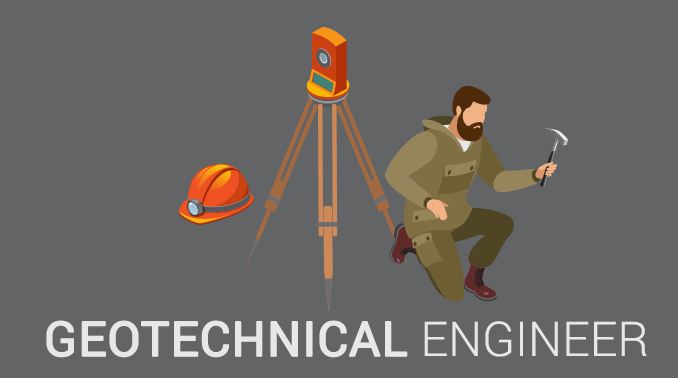Getting The Geotheta To Work
Getting The Geotheta To Work
Blog Article
An Unbiased View of Geotheta
Table of ContentsThe Main Principles Of Geotheta How Geotheta can Save You Time, Stress, and Money.The Main Principles Of Geotheta 9 Simple Techniques For GeothetaThe Single Strategy To Use For Geotheta

They conduct website investigations, collect samples, perform research laboratory examinations, and evaluate data to examine the suitability of the ground for building jobs - Geotechnical Engineers. Based on their findings, geotechnical designers offer referrals for foundation design, incline stability, preserving frameworks, and mitigation of geotechnical hazards. They work together with other specialists, such as engineers, structural designers, and building groups, to make sure that geotechnical factors to consider are integrated into the total task design and application
By assessing the behavior and homes of soil and rock, they can recognize possible geotechnical threats such as landslides, dirt negotiation, or slope instability. Their competence aids protect against failings or crashes that might threaten lives and residential property. Right here are some detailed duties and responsibilities of a geotechnical engineer: Website Examination: Geotechnical designers conduct website examinations to gather information on subsurface conditions.
They interpret the information to understand the homes and behavior of the dirt and rock, including their strength, permeability, compaction attributes, and groundwater problems. Geotechnical Analysis and Design: Geotechnical engineers analyze the data collected during site investigations to evaluate the stability and viability of the site for construction projects. They execute geotechnical estimations and modeling to examine aspects such as bearing capacity, negotiation, incline stability, side planet pressures, and groundwater circulation.
What Does Geotheta Mean?
Structure Style: Geotechnical designers play a crucial role in creating foundations that can safely support the designated structure. They assess the soil conditions and tons demands to determine the appropriate structure kind, such as superficial foundations (e.g., grounds), deep foundations (e.g (https://pubhtml5.com/homepage/jugmn/)., stacks), or specialized techniques like dirt renovation. They think about elements such as settlement limits, bearing ability, and soil-structure communication to develop ideal foundation designs
They examine building plans, display website tasks, and carry out field evaluations to confirm that the layout suggestions are complied with. If unforeseen geotechnical issues emerge, they evaluate the circumstance and provide suggestions for removal or changes to the design. Danger Assessment and Mitigation: Geotechnical engineers assess geotechnical threats and threats linked with the project website, such as landslides, liquefaction, or dirt disintegration.

Partnership and Interaction: Geotechnical engineers function carefully with other experts associated with a task, such as designers, structural engineers, and building groups. Efficient communication and collaboration are necessary to incorporate geotechnical factors to consider right into the total job design and construction process. Geotechnical designers offer technological knowledge, answer questions, and make sure that geotechnical demands are satisfied.
The 4-Minute Rule for Geotheta
Below are some sorts of geotechnical designers: Structure Engineer: Foundation visit homepage designers focus on making and analyzing structures for structures. They examine the soil conditions, load requirements, and site qualities to figure out one of the most suitable foundation kind and layout, such as shallow foundations, deep foundations, or specialized strategies like pile structures.
They assess the aspects affecting incline stability, such as soil properties, groundwater conditions, and slope geometry, and develop techniques to avoid incline failures and alleviate risks. Quake Engineer: Quake designers specialize in assessing and designing structures to endure seismic forces. They examine the seismic danger of a website, assess soil liquefaction potential, and establish seismic layout standards to guarantee the safety and security and durability of frameworks throughout quakes.
They carry out area testing, collect examples, and analyze the accumulated information to define the dirt residential properties, geologic developments, and groundwater problems at a site. Geotechnical Instrumentation Engineer: Geotechnical instrumentation engineers focus on monitoring and determining the behavior of soil, rock, and frameworks. They set up and keep instrumentation systems that keep track of aspects such as soil settlement, groundwater degrees, slope motions, and architectural variations to assess performance and offer early warnings of possible issues.
The Buzz on Geotheta
They perform examinations such as triaxial examinations, combination examinations, straight shear tests, and leaks in the structure examinations to gather data for geotechnical evaluation and layout. Geosynthetics Engineer: Geosynthetics engineers specialize in the design and application of geosynthetic materials, such as geotextiles, geogrids, and geomembranes. They make use of these products to enhance dirt stability, reinforce inclines, offer drainage services, and control disintegration.
They tend to be investigatory individuals, which means they're intellectual, introspective, and inquisitive. They are interested, methodical, rational, analytical, and rational. Some of them are likewise social, implying they're kind, charitable, cooperative, individual, caring, useful, understanding, skillful, and friendly - Geo Tech Engineer.
In the workplace atmosphere, geotechnical designers utilize specialized software application tools to carry out calculations, create designs, and assess information. They prepare reports, review project specifications, connect with customers and group participants, and coordinate job tasks. The workplace setting provides a helpful atmosphere for research, evaluation, and cooperation with various other specialists included in the task.
Geotheta Fundamentals Explained
They often go to job websites to carry out site examinations, evaluate geotechnical problems, and gather data for evaluation. These visits involve traveling to various places, occasionally in remote or tough surfaces. Geotechnical engineers might do dirt sampling, conduct tests, and display building and construction activities to make certain that the geotechnical elements of the project are being implemented appropriately.
Geotechnical engineers additionally operate in specialized geotechnical laboratories. In these facilities, they perform experiments, do tests on dirt and rock samples, and analyze the design residential or commercial properties of the products. Geotechnical lab designers function extensively in these environments, managing screening tools, running instruments, and tape-recording information. They team up with other laboratory personnel to make certain accurate and trustworthy screening outcomes.
Report this page